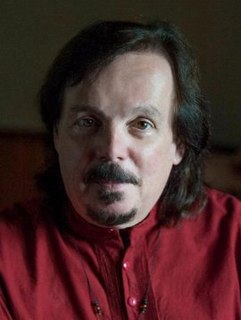A Quote by John Dewey
The good society was, like the good self, a diverse yet harmonious, growing yet unified whole, a fully participatory democracy in which the powers and capacities of the individuals that comprised it were harmonized by their cooperative activities into a community that permitted the full and free expression of individuality.
Related Quotes
When we talk about Cuban democracy we are referring to participatory democracy which is big difference with representative bourgeois democracy. Our is a democracy in which everything is consulted with the people; it is a democracy in which every aspect and important decision that has an impact in the life and society of the people, is done in consultation.
Individuals understood in relational terms cannot be conceived as fully separate from their communities. Others in one's community may already be a part of the self. This conception of the person as overlapping in identity with others has normative implications for what constitutes the good of the individual and how that good relates to the good of others. One's relationship with others can form a part of one's good as an individual, such that one can have a compelling interest in the welfare of these others and in one's relationship with them.
We must show that liberty is not merely one particular value but that it is the source and condition of most moral values. What a free society offers to the individual is much more than what he would be able to do if only he were free. We can therefore not fully appreciate the value of freedom until we know how a society of free men as a whole differs from one in which unfreedom prevails.
If you are a cooperative animal you need to watch what you get. If you, or even a whole community, invest in something but then a few individuals receive a much larger return, it's not a good arrangement. If it happens consistently, it's time to look for an arrangement that is more beneficial. That's why we're so sensitive to how rewards are being divided.
While a great many other ideas and measures are of prime importance for the good life of the community, that which concerns its architectural expression is the notion of the community as limited in numbers, and in area... To express these relations clearly, to embody them in buildings and roads and gardens in which each individual structure will be subordinated to the whole - this is the end of community planning.
Individuals are certainly interested, at times, in having their own way, and their own way may go contrary to the ways of others. But they are also interested, and chiefly interested upon the whole, in entering into the activities of others and taking part in conjoint and cooperative doings. Otherwise, no such thing as a community would be possible.
But progress in knowledge has made us aware of the superficiality of Plato's lumping of individuals and their original powers into a few sharply marked-off classes; it has taught us that original capacities are indefinitely numerous and variable. It is but the other side of this fact to say that in the degree in which society has become democratic, social organization means utilization of the specific and variable qualities of individuals, not stratification by classes.
When a school introduces and trains each child of society into membership within such a little community, saturating him with the spirit of service, and providing him with the instruments of effective self-direction, we shall have the deepest and best guaranty of a larger society which is worthy, lovely, and harmonious
Neoliberal democracy. Instead of citizens, it produces consumers. Instead of communities, it produces shopping malls. The net result is an atomized society of disengaged individuals who feel demoralized and socially powerless. In sum, neoliberalism is the immediate and foremost enemy of genuine participatory democracy, not just in the United States but across the planet, and will be for the foreseeable future.
I care deeply about women's rights. I have been an outspoken advocate for them for many years and as secretary of state I carried that message around the world because empowering women, providing for women's rights, their full participation in society, politics, the economy is not only a matter of individuals being able to chart their own futures. It's good for democracy and it's good for peace and prosperity.
According to the oral tradition of Witches, we were once the priests and priestesses of a peasant Pagan religion. Members of this secret sect met at night beneath the full moon, for these were the "misfits" and "outcasts" who did not fit into mainstream society. Little has changed over the centuries and the Witchcraft community still embraces individuals frequently rejected in mainstream society. These include gays, lesbians, transgendered individuals, and other people with the courage to live their lives authentically in accord with who they are inside their hearts, minds, and spirits.






































